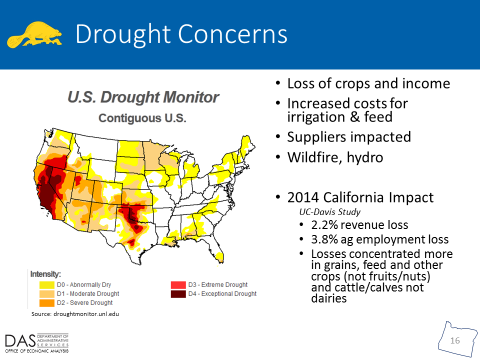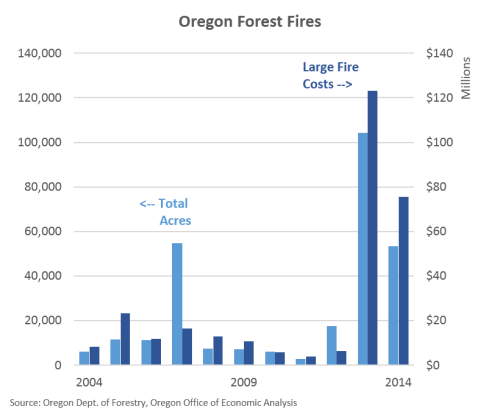Release by Josh Lerner, Office Economic Analsysi
As the drought continues to worsen and spread, its impact — both potential and real — on the economy is a risk to the outlook, particularly at the local level. Our office included the following slide in our presentation to the Legislature at the last forecast release.
While the UC-Davis study impacts may not be particularly large at the state level in percentage terms, they do add up to a considerable sum of money in terms of lost sales and are certainly felt at the local level in California’s central valley. Here in Oregon, we unfortunately have somewhat of a similar example in the recent past, I think. To many, the 2001 recession is generally considered the fallout from the tech bubble. Places like the Bay Area, Portland, Seattle and other tech-heavy locales were especially hard hit, while many parts of the country largely skated by with not much of a true downturn, even if there was a period of general malaise. However, in Oregon we have the Klamath Basin which has had ongoing water issues for a long time, including back in 2001 when the courts stopped water deliveries to farms in the area. Of course there are other issues going on, like the national downturn, flow of migrants, being a part of the Timber Belt and its longer run trends, possibly major employers cutting back and the like. However, here we see a regional economy suffer large losses, none of which are directly tied to the specific nature of the business cycle. [Additional information/corrections on this are welcomed and encouraged.]
Lastly, one major concern with a drought is the potential for increased wildfire damage. The past two years have seen particularly large fire costs for the state. So far the number of acres burned in early 2015 is relatively small, but the early part of the year is just a percent or three of the annual total as “peak” wildfire season is still to come.
Overall, the impact to the state economy (and budget) from the drought to date is largely theoretical but remains a concern and a risk. To the extent that the drought continues, and worsens, such theoretical concerns will unfortunately turn into actual impacts.









